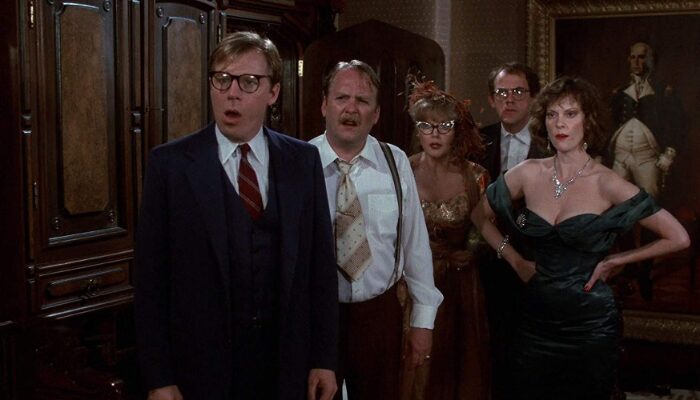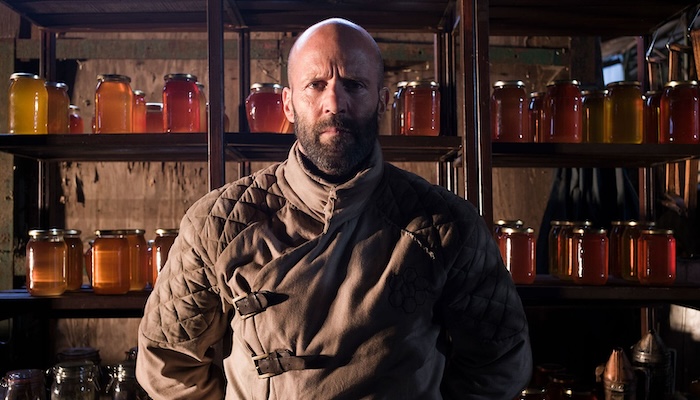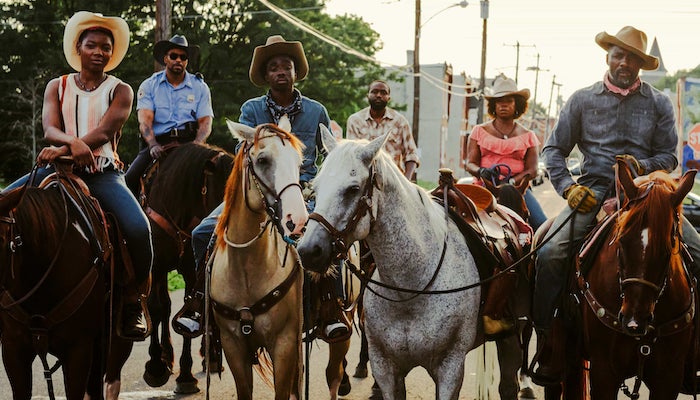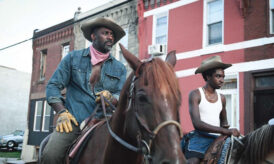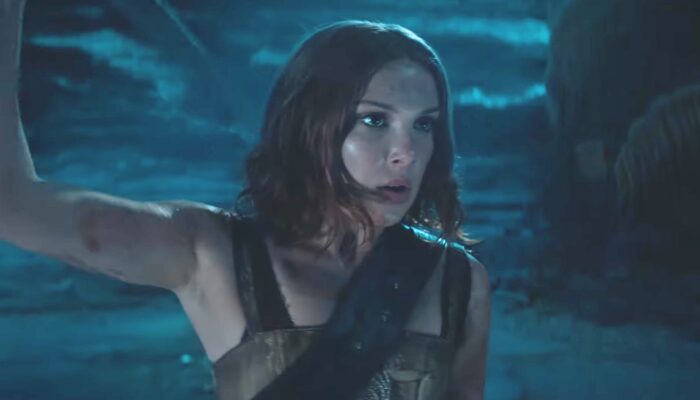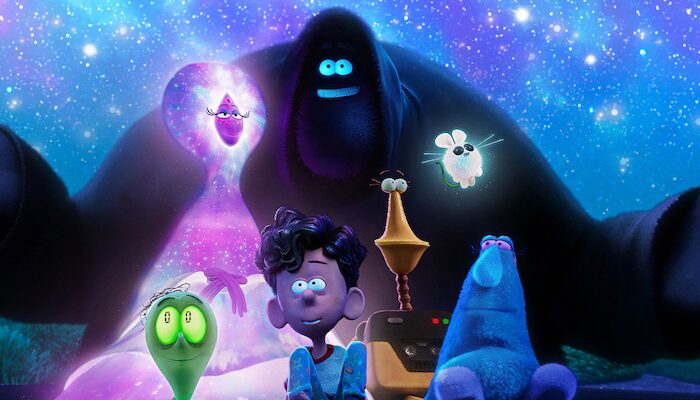Film Review: CONCRETE COWBOY (2020): A Fascinating Blend of Aesthetics, Drama, and Perspective in Service of the Urban Cowboy
Concrete Cowboy Review
Concrete Cowboy (2020) Film Review, a movie directed by Ricky Staub, and starring Idris Elba, Caleb McLaughlin, Lorraine Toussaint, Jharrel Jerome, Clifford “Method Man” Smith, Byron Bowers, Ivannah-Mercedes, Swen Temmel, Patrick McDade, Michael Ta’Bon, Jamil Prattis, Jennifer Butler, Liz Priestley, Kristoffe Brodeur, and Devenie Young.
Hollywood may sanctify cowboys to near-legendary status as a relic of eras long gone, but what does that make of the real ones who still exist to this day? Living in big cities, nonetheless, and far and away from the John Wayne archetype. Will they get their legendary status, too?
Concrete Cowboy, the feature-length directorial debut from Ricky Staub, is not just a look at the lives of Black urban cowboys, but an assurance that they exist in the first place as well as a defense for their stature within the modern world.
Cole (Caleb McLaughlin), an African-American teenager plagued with disciplinary issues and a growing list of expulsions, is suddenly uprooted from his life in Detroit by his working-class mother (Liz Priestley), who fears he’s headed too far down a dangerous path. She discards him in Philadelphia, their hometown, on the doorstep of his estranged father, Harp (Idris Elba), who regards Cole with a cold shoulder. Things become all the more distant between them when Cole learns of Harp’s urban equestrian lifestyle – something that’s more or less alien to a modern-day city kid like himself – and Harp is unkeen to connect with Cole outside of anything but hard labor around the horse stables. To make matters worse: there’s nothing but beer and cheese slices in the fridge, Cole has to share his sleeping quarters with a full-grown horse, and even the neighbor lady Nessie (Lorraine Toussaint) isn’t any help (as she refuses to interfere with Harp’s parenting style).
Thankfully, an old stomping ground also means old friends and Cole soon reunites with his childhood best friend, Smush (Jharrel Jerome), who offers a much-needed reprieve from the horse-heavy home life. But while Smush’s sense of camaraderie is more exciting than Harp and the Fletcher Street riders’ campfire songs, it comes with dangerous entanglements with the world of organized crime. Cole is then put at a crossroads of character as he must decide whether to rehabilitate the relationship with his father or let it rot in favor of riches.
The ultra-niche focus on a particular Black subculture is both what makes Concrete Cowboy unique and helps to bolster its authenticity. Based on Greg Neri’s 2011 young-adult novel Ghetto Cowboy – which itself is a fictionalized portrayal of the Fletcher Street Urban Riding Club and similar groups – the film offers a peak into a world that many of us probably never knew existed. And of course, that lack of representation is intentional as part of a decades-long – if not centuries-long – whitewashing attempt by mass media to the control the cultural narrative. Such conflict is pivotal to the film’s central conceit, as Staub and co-writer Dan Walser maybe all too directly give credence toward it (like during the fireside chat scene when Nessie talks of Hollywood whitewashing, and the other riders reaffirm to Cole that, contrary to popular belief, there have always been Black cowboys and horse wranglers). In that way, Concrete Cowboy’s mere existence is a breath of fresh air that works to counter the mainstream conditioning regarding Black urban life, which tends toward monolithic interpretations more often than not.
The set-up also recalls last year’s Charm City Kings, a similar bildungsroman about Black youth looking towards riding subcultures as a means of belonging (although Concrete Cowboy trades out the horsepower of ATVs for … well, literal horsepower). Community leaders in both of the films also rely on these subcultures as methods to build life skills and deter teens away from criminal involvement: while in Kings Meek Mill’s Blax teaches Jahi Di’Allo Winston’s Mouse responsibility through motorbike maintenance, in Cowboy Harp, Nessie, and the other Fletcher Street riders aim to teach Cole responsibility via grounds maintenance and animal care.
But just like Kings, Cowboy suffers from the same shortcomings, primarily: a reluctance to thoroughly grapple with the socioeconomic conditions that led to their lead characters’ conflicts in the first place.
Cowboy allots momentary addresses of such struggles with how they specifically relate to the riders – the industrialization of transportation making horse wranglers obsolete, the cooperation of city officials with land developers in ways that further spur gentrification along – but it seems reluctant to address the issues that affect the urban areas of Philadelphia on the whole, and why such groups like the Fletcher Street riders need to exist as youth crime deterrents in the first place. Far be it from me, a white man, to lecture others on how to tell their stories about the Black experience (though I believe Staub himself is white), yet it seems odd that these films just sort of preface the criminal underworld as a nefarious concept decoupled from a long American tradition of systemic racism and other oppressive forces.
But Cowboy is still rather complex in its approach – mostly thanks to Smush’s role, whose brief backstory insinuates the prevalence of shortcomings on both a wider societal level and a more specific, community-based level (and through which Jerome plays him with a youthful intensity). It also throws in the thematic wrench of people over place as a mantra, which is simultaneously affirming as it is complicating as it pertains to Cole and Harp’s rocky relationship. Elba and McLaughlin exude that conflict through scenes of both explosive anger and quiet duress, and the film’s overall sense of inner turmoil and grit echoes through the handheld and sun-streaked visuals. It’s hard to deny oneself the pleasure of parsing through something that may not be as rich as it wants to believe, yet is still a fascinating blend of aesthetics and drama. And Kevin Matley’s vibrant score is an easy pill that makes the film go down all the more smoothly.
In short, Concrete Cowboy is a unique perspective told well, even if its narrative constructs leave something to be desired.
Rating: 6/10
Leave your thoughts on this Concrete Cowboy review and the film below in the comments section. Readers seeking to support this type of content can visit our Patreon Page and become one of FilmBook’s patrons. Readers seeking more film reviews can visit our Movie Review Page, our Movie Review Twitter Page, and our Movie Review Facebook Page. Want up-to-the-minute notifications? FilmBook staff members publish articles by Email, Twitter, Facebook, Instagram, Tumblr, Pinterest, Reddit, and Flipboard.
Related Articles
FilmBook's Newsletter
Subscribe to FilmBook’s Daily Newsletter for the latest news!





